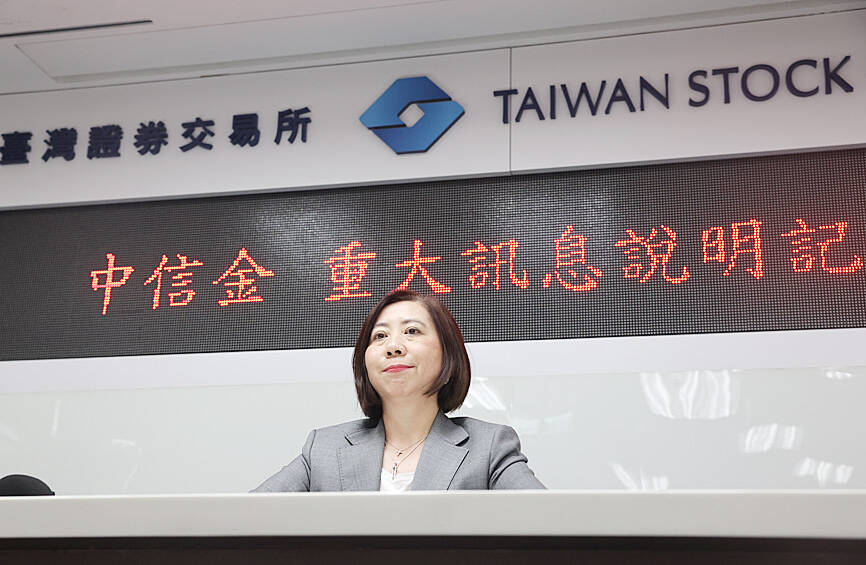CTBC Financial Holding Co (中信金控) yesterday offered to acquire Shin Kong Financial Holding Co (新光金控) via a cash and share swap deal totaling NT$14.55 per share, saying it would prove a better choice for the life insurance-focused conglomerate, its employees and shareholders.
The offer would suggest a 28.5 percent premium over NT$11.32 per share the other contender, Taishin Financial Holding Co (台新金控), unveiled a day earlier.
CTBC president and spokeswoman Rachael Kao (高麗雪) said the group aims to buy 51 percent of Shin Kong for NT$131.4 billion (US$4.11 billion) so that it would dominate the boardroom and ensure the smooth running of the firm.

Photo: CNA
The buyout attempt would feature NT$4.09 per share in cash and a share swap scheme under which one Shin Kong share would exchange for 0.3132 CTBC shares, Kao said.
That would translate into NT$14.55 per share based on CTBC’s three-day average closing price of NT$33.4, she said.
“The acquisition would enable CTBC to grow into the largest local financial conglomerate by assets and a serious player in the region,” Kao said.
CTBC has demonstrated its ability and competence in integrating other firms as evidenced by its life insurance subsidiary Taiwan Life Insurance Co (台灣人壽), she said.
Taiwan Life has consistently turned profit one year after joining CTBC Financial, she added.
Shin Kong Financial, while a laggard in profitability among its peers, is a worthy investment target given its life insurance, banking and securities presences, Kao said.
It also makes more sense for a company with bigger assets to acquire a smaller one, rather than the other way around, she said, adding that CTBC ranks No. 3 with NT$8.38 trillion of assets, ahead of Shin Kong’s NT$5.08 trillion assets in fifth place.
Taishin Financial has NT$3.2 trillion of assets in 13th place.
CTBC would submit acquisition documents early next week and would carry out the buyout on the open market after the Financial Supervisory Commission (FSC) gives the go-ahead, Kao said.
Kao declined to comment on the time frame of the deal or title of the consolidated entity, saying they are minor concerns compared with legal compliance, financial market stability and the interests of shareholders.
CTBC also refused to promise that it would retain all Shin Kong employees, saying it is more important to enhance the profitability of Shin Kong so its employees would enjoy better pay.
The FSC and Shin Kong shareholders have the final say on the matter.

When an apartment comes up for rent in Germany’s big cities, hundreds of prospective tenants often queue down the street to view it, but the acute shortage of affordable housing is getting scant attention ahead of today’s snap general election. “Housing is one of the main problems for people, but nobody talks about it, nobody takes it seriously,” said Andreas Ibel, president of Build Europe, an association representing housing developers. Migration and the sluggish economy top the list of voters’ concerns, but analysts say housing policy fails to break through as returns on investment take time to register, making the

‘SILVER LINING’: Although the news caused TSMC to fall on the local market, an analyst said that as tariffs are not set to go into effect until April, there is still time for negotiations US President Donald Trump on Tuesday said that he would likely impose tariffs on semiconductor, automobile and pharmaceutical imports of about 25 percent, with an announcement coming as soon as April 2 in a move that would represent a dramatic widening of the US leader’s trade war. “I probably will tell you that on April 2, but it’ll be in the neighborhood of 25 percent,” Trump told reporters at his Mar-a-Lago club when asked about his plan for auto tariffs. Asked about similar levies on pharmaceutical drugs and semiconductors, the president said that “it’ll be 25 percent and higher, and it’ll

NOT TO WORRY: Some people are concerned funds might continue moving out of the country, but the central bank said financial account outflows are not unusual in Taiwan Taiwan’s outbound investments hit a new high last year due to investments made by contract chipmaker Taiwan Semiconductor Manufacturing Co (TSMC, 台積電) and other major manufacturers to boost global expansion, the central bank said on Thursday. The net increase in outbound investments last year reached a record US$21.05 billion, while the net increase in outbound investments by Taiwanese residents reached a record US$31.98 billion, central bank data showed. Chen Fei-wen (陳斐紋), deputy director of the central bank’s Department of Economic Research, said the increase was largely due to TSMC’s efforts to expand production in the US and Japan. Investments by Vanguard International

WARNING SHOT: The US president has threatened to impose 25 percent tariffs on all imported vehicles, and similar or higher duties on pharmaceuticals and semiconductors US President Donald Trump on Wednesday suggested that a trade deal with China was “possible” — a key target in the US leader’s tariffs policy. The US in 2020 had already agreed to “a great trade deal with China” and a new deal was “possible,” Trump said. Trump said he expected Chinese President Xi Jinping (習近平) to visit the US, without giving a timeline for his trip. Trump also said that he was talking to China about TikTok, as the US seeks to broker a sale of the popular app owned by Chinese firm ByteDance Ltd (字節跳動). Trump last week said that he had